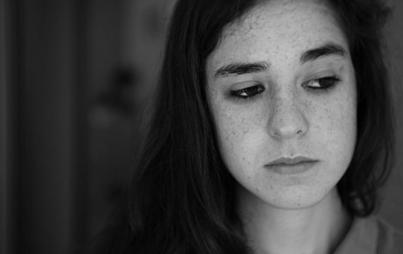
Photo by Dmitry Schemelev on Unsplash
Content Notice: Self-Harm, Suicide
I have a callus on my left foot. It beckons me — especially when I have already cut it, and the scabs are white and soft from the shower. It would be so easy to slice a knife underneath it. But that would be foolish. Cutting is addictive. So I take my nail and try to dig it underneath the dead skin. But I can only chip at the edges, and that is just silly. So I get up off the couch and head into the bathroom where I sit down on the floor with a Swiss Army knife and carefully, precisely dig in. The blade slides nicely under the dead skin, but it does not make it bleed. I need the blood. So I stick the knife into the fleshy white scabs, and the blood starts to flow. And that makes me feel warm in my chest — as if I had taken a sip of fancy bourbon. I squeeze around the cut to make the blood ooze more. I love the blood.
I lift myself ever so gently off the floor and reach for a tissue, setting it next to the blood to watch it seep. My middle school science teacher taught me this trick: put a piece of paper next to liquid, and the liquid will slowly be absorbed by the paper on its own. When I am done watching the blood, I carefully wash it with another tissue, put some Neosporin on it, then a waterproof band-aid. I do not want it to get infected. I do not want anyone to see it. Plus, the last time I cut myself the blood dripped all over the living room floor and I had to clean it up before the dog could lick it or my husband could see it. It strikes me that I am mutilating my left foot when I had major ankle surgery on my right. I never expected to talk about this. I certainly never expected to talk to you about this.
I catch myself hiding all the time. Writing this essay was far less painful than talking to my husband about nearly all of its content. Which, much as I hate to admit it, makes it all the more important to share.
In an essay Anderson Cooper published about his brother Carter dying by suicide, he wrote about how he thought he and his brother were close, but after Carter’s suicide, he questioned whether that was true. I am going to wager it was. Because it does not just hurt to be mentally ill, it hurts so much that it is unbearable to share with your loved ones. I catch myself hiding all the time. Writing this essay was far less painful than talking to my husband about nearly all of its content. Which, much as I hate to admit it, makes it all the more important to share. Fuck.
I have a mental illness. I am mentally ill. I can barely bring myself to say the words. I have not uttered the phrase “I am mentally ill” out loud. Every time I try to, I stop; it fills me with such shame and pain and loneliness, and I cannot say it. Who am I to be (fuck, ouch) mentally ill? I cannot stand the idea that I am mentally ill. I hate myself for being mentally ill.
I cannot remember who first diagnosed me with Bipolar II disorder. I can remember the moment when I knew something was wrong. I was twenty; I was on the college paper, majoring in political science, and I was walking home with a boy from a bar. I was wearing a low-cut sleeveless baby pink shirt with matching pink stilettos with bows on the toes when that first wave of sadness smacked me in the face. I placed one bow in front of me. Smack. Placed the second bow next to the first. Smack. Then I moved on.
I found a psychiatrist I liked well enough and got the necessary prescriptions. Moved on until I decided I no longer needed a psychiatrist and went to a primary care physician who prescribed me an antidepressant that made me hypomanic and my therapist (more on her later) made me start seeing a psychiatrist again.
So much for putting one pink stiletto in front of the other.
I am coming up on fourteen years since that first face-smack. Yet I am still in pain for so many reasons, one of which is the variety of stages of denial I have gone through about my (fuck, ouch) mental illness.
I drew a line between my mood disorder and my real life.
When I first interviewed my therapist of ten years, I very boldly and insistently told her I was coming to therapy to work through my intimacy issues because I wanted to get married someday, but I also had this mood swing diagnosis, and that had nothing to do with my intimacy issues, and I did not want to talk about that with her. This is something we laugh about now. This is something I grimace about now. But I was a badass. I was open and honest and fearless, and I got what I wanted. I tackled and conquered all the challenges and curveballs life through my way. My mental illness (honestly, every time I type it, I know it gets old, but god it hurts) went into a box in a corner that could be treated with medication. It was not a part of who I am.
That is why it hurts: my mental illness is part of who I am. I am mentally ill.
And who am I to be mentally ill? Who bestowed this immense privilege of neurons and trauma that provides me with an inane excuse to take entire months off from living my life? Does mental illness run in my family? Yes. Am I homeless? No. I grew up in the wealthy suburbs of Philadelphia. Did I grow up in a state of poverty? No. See above. Was I physically abused? My mother is the master of emotional abuse. In what world does that count?
I have loads of friends who — assuming I could muster the courage to talk to them —would be right there for me. I have access to all the resources I need — should I choose to access them. Who said to waste it on me?
I hate myself for being mentally ill. My life is fantastic. I am in a happy and healthy marriage. I have the luxury of freelancing — even though I live in Manhattan — so I have time to write and rehab my ankle and go to the farmers market and take long walks with the dog. So many would kill to have my life. It is wonderful. Except it is fucking awful. And why should I get not to work full-time, not focus on a career, not manage my time well, eat vats of icing when I try not to cut myself? Who gave me permission to take care of myself? Isn’t there more in life to do?
The harder I tackle my mental illness the more hopeless it feels to conquer.
When I told my psychiatrist that I was frustrated I could not fix myself, she pointed out that one, no I could not fix myself; and two, in trying to tell myself I could fix myself I was setting myself up for failure which was just another means of self-harm. She suggested that maybe I look at this time as a journey, acknowledge this will be a lifelong journey. She is right.
But she also put me on lithium.
It used to be so incredibly important for me to draw the line. Bipolar II on one side. Miriam on the other. I had ground rules for telling people about the Bipolar II. They could not confuse who I am with the diagnosis. (Then I would have to confuse me, too.) I could be in a bad mood for real reasons. Or good ones, for that matter. I took medication so that I could be living the life I wanted to live. I was not manic. I do not have psychotic breaks, and I have never been hospitalized. I just have mood swings, and the up-swing happens to be called hypomania. This is the real me.
Some days I can (begrudgingly) accept that my mental illness and my real life have a relationship of their own. Some days I know I have to accept their relationship; I have to work on it even though I cannot control it. Most days I want to shed my mental illness so much it makes my skin crawl. But my real life will not let me.
You Might Also Like: If You See Me Slipping Into Depression, Please Reach Out
I used to have distractions. But I am no longer working sixteen-hour days, planning a wedding, working out and eating well to successfully lose eleven pounds only to gain eight of those hard-earned pounds back, raising my sister and then my brother, moving myself and my husband across the country. I used to chalk up depressive episodes to circumstance. Ditto hypomanic episodes. If I took the time to recognize them at all. But now? My life is eerily, agonizingly still. There are no more lines to draw.
The cutting is low. It is deep and disgusting and addictive. It is an impulse I fight to control. But it is an action that provides me with the illusion of control. I can control my pain. I can provide myself with pain that feels sharp and refreshing and unlike the dull pain looming around me. The rational neurons in my brain are begging my neurotransmitters to leave the knife on the floor. I grab extra tissues to better stanch the blood; I want to be prepared this time. The flesh has hardened, and the first cut simply pulls the skin apart. I watch my hand twist the tip of the knife into the callus. It stings. Then the blood starts flowing, and I breathe a sigh of relief.
Sharing this is painful which is ironic because one of the hardest things about being mentally ill is how lonely it is.
No one else gets it. No one understands that the answer to “What’s wrong?” is “nothing.” That sometimes “I love you” cannot reach you and sometimes “I love you” gives you everything you need to hold on.
That some days you wake up and you know it is going to be a bad day and that there are so many things you could do, should do, that might make it a slightly better day, but that you cannot bring yourself to go to the gym or take the dog to the park or cook or write or just do menial tasks on your to-do list. So instead you sleep or sit on the couch and then suddenly the day is gone and it is still bad, and you have nothing to say for it.
That there are some days you thank the fucking lord you have obligations that force you out of the house because you are not sure you would make it through the day otherwise, but when you do get out of the house on those days, you are still numb, walking through air that you cannot feel. That you have to force yourself to take the dog out to pee so you have an excuse to go to the pharmacy and buy a vat of icing so you will not cut yourself again. That you know the vat of icing will only make you feel worse about your body but you still do it and you know that is why you do it and what you really should be doing is walking to the gym, but it feels too far.
That you do not know if it would be better or worse if you did not work from home because on the one hand, it might be stimulating to be around other people and have a non-negotiable reason to get out of the house, but on the other hand, you have days where you thank god you are working from home because you do not know if you could meet daily deadlines anymore. How do you expose yourself without feeling, seeming, so damn pitiful?
The loneliness is suffocating. It physically hurts.
Sharing this is terrifying for all the wrong reasons, too. I am not a celebrity who can be celebrated for sharing or written off by the world as “who cares.” I do not have a “platform.” I am someone whose future employers will know way too much. I do not need my clients or friends or family to know that I have days where I just have three hours of energy and that is all that happens on that particular day. But I have those days.
What will they think? That I am wasting all this time I have on being mentally ill? That seems ridiculous.
How do you explain to someone that there is something deep inside of you causing your pain and that sometimes getting through the day is all you can ask yourself to do?
How can nothing else be wrong? There has to be a reason you are so sad. Or else why would you be sad?
If you share, who will come out of the woodwork? Who will say “I love you” or “I had no idea” or “what can I do?” And do you want those people to come out of the woodwork? Why would they come out, why would they care? Would it be about them or would it be about you? If you share, will it matter? Or do you just keep it to yourself because it is yours?
The day Anthony Bourdain killed himself it seemed like the whole world was so singularly fixated on why such a joyful person could want to die. His mother told The New York Times he was “absolutely the last person in the world [she] ever dreamed would do something like this.” Which is oddly unsurprising to me. Because it is not just that it is hard to share your mental illness or that it can be easy to pretend you feel well; it is that you can be in the depths of despair and still have inexplicable and unpredictable good days. Days when you wake up and you know it is going to be a good day and you cook new recipes and shave your legs and design party invitations — until you remember that you have no idea why you are having a good day or how to replicate it the next time you have a bad day so the good day no longer makes you smile. Days when you wish you were in a hypomanic state because that would make sense at least. But you are bubbly and shiny and fun on the outside, while inside the painless days just make the painful days hurt so much more.
In my hypothetical world where I merely disappear, and everyone around me is shocked, the good days make me wonder if I might be shocked as well.
No matter how much success I build for myself, in whatever form that transpires, that will not be enough...This is my journey. And it is a lifelong one
I put the Swiss Army knife back in my bathroom drawer where I hide it under a package of DenTek floss picks. It belongs to my husband. It was a groomsman gift and has his initials engraved into it. I always wipe it down after I use it. But I am not going to give it back to him. I might need it again, and I want to have access to it. I also know that if he were to hide it from me, I would be inconsiderably furious with him.
The night of the day Kate Spade died, we were sitting on the couch with our dog while I tried to explain how her suicide made me crack a little.
“There’s more to that story. There’s something we do not know yet. There always is with celebrities,” he insisted.
“I really don’t think so,” I said. “I think you’re wrong. And it is terrifying.”
“Terrifying how?”
“Terrifying in that I get it. I get how someone could be cheerful and feel satisfied and then have fifteen minutes of deep pain and loneliness with no immediate emotional support, and within those fifteen minutes, have the wherewithal to kill themselves,” I said and crossed my arms.
Her suicide also affirmed my deepest fears: that no matter how much success I build for myself, in whatever form that transpires, that will not be enough. And that my psychiatrist is right. This is my journey. And it is a lifelong one.
“Are you suicidal?” my husband glanced at me gently.
“No,” I said it without skipping a beat.
“If you were suicidal, would you tell me?”
I flashed back to a few weeks ago when I accidentally left a receipt for a vat of icing on the table. I try to pay cash for those so that I do not have to talk about my sugar binges and how to try and stop them. But then I had to talk to him about it.
“No,” I concluded.
“Would you tell someone?”
I ran through my options. My husband. My sister. My friends? No, no one else would know what to do with the information. Here comes the ultimate twist: It turns out it is heart-shattering to share with your husband or your sister, who have so much trust and faith in you because it is too overwhelming to admit you have no solution yet. Because it hurts too much to tell the people you love most in the world — and who love you most — that you are at your wit's end and out of options and out of ideas for your excruciating existence. Maybe that is the reason to share here.
“My therapist,” I finally came up with an answer.
He nodded. “Okay. So long as you feel you can tell her.”
It struck me that maybe he was so emphatic about Kate Spade because he was terrified that I might be in the same place as she was.
I was catching up with a dear friend sometime in the middle of all this, and I was telling her about how I do not always tell my husband when I cut myself — which is when I realized I had not told her about the cutting whatsoever. She, too, asked me if I were suicidal, and I did not really have an answer. She asked me if there were a way she could ask me how I was doing every time we talked. I told her she could just ask me how I was, that just knowing she cared would be enough. She did not buy it. She suggested that she ask me how “Lucy” was doing, and I could tell her that way. “Lucy” is a euphemism for my depression. I preferred the name Suzie, I told her.
“So how is Suzie?” she asked.
“Suzie is fine.”
She arched her eyebrows and looked at me hard.
“Suzie is here.”








